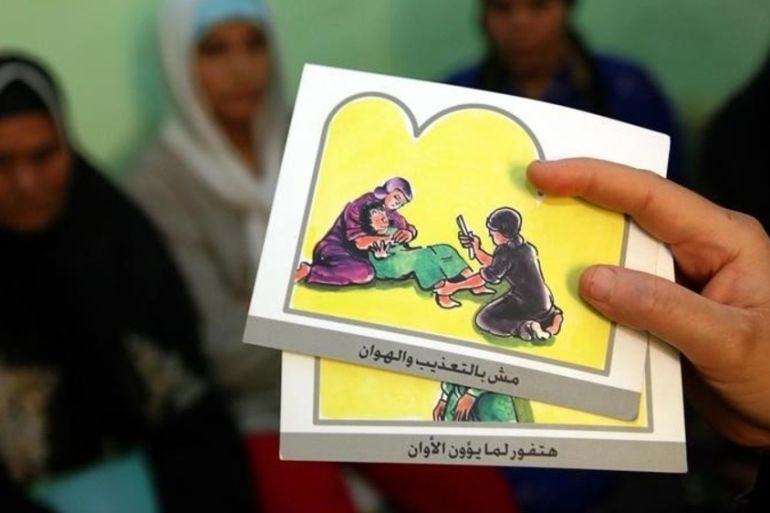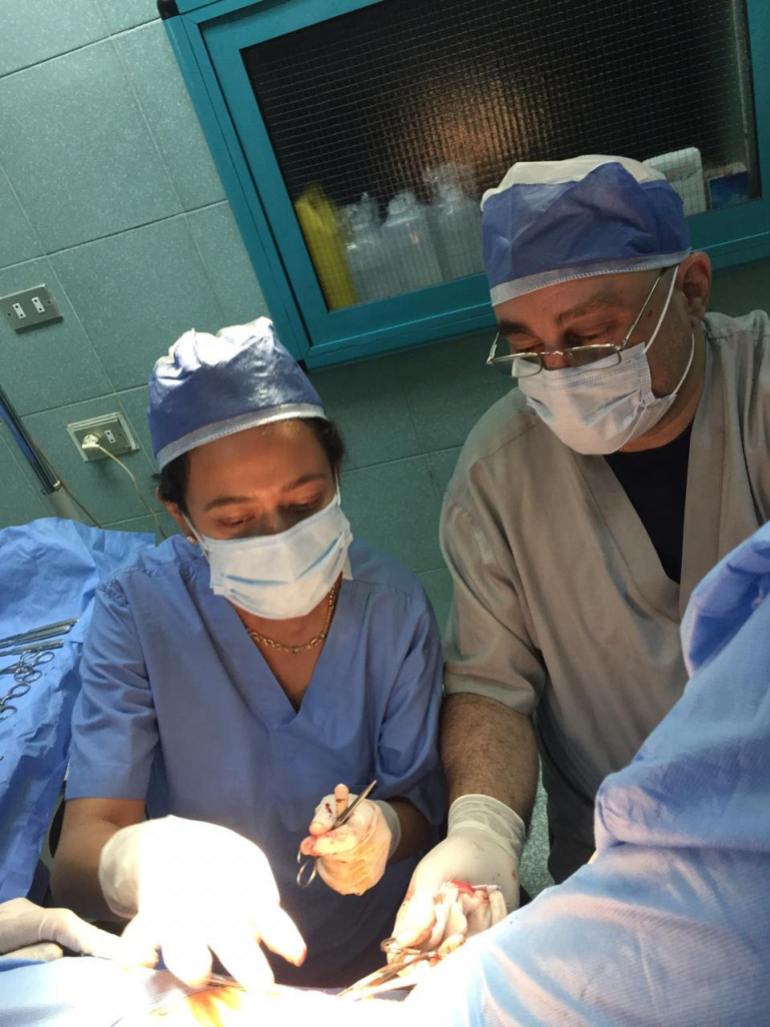‘Starting over’: FGM clinic gives hope to traumatised Egyptians
Restore is Egypt’s first health centre that offers multidisciplinary treatment for survivors of female genital mutilation.

Cairo, Egypt – Maryam, 28, an Egyptian master’s student of anthropology, recalls with great vividness the day she underwent circumcision.
She was 11 years old and her mother and aunt brought a “da’ya”, or traditional midwife, to their home in a working-class district in the coastal city of Alexandria. The woman told her to lie down on her bed and then spread her legs and daubed an anaesthetic cream inside her, then reached for a razor blade she had cauterised with a flame.
Keep reading
list of 4 itemsNetflix film Perfect Strangers challenges Middle East taboos
Infographic: Mapping violence against women
Kenyan court upholds ban on female genital mutilation
“I don’t remember the moment itself but I remember after, the woman gave that piece of me, wrapped in gauze to my young aunt and told her to bury it, and that way she would meet a wonderful bridegroom,” Maryam told Al Jazeera.
“I felt I had sacrificed something of myself, just for my aunt to find a husband.”
Maryam had undergone female genital mutilation (FGM), which involves partial or total removal of the external genitalia or other cutting for non-medical reasons. More than 200 million women suffer from FGM worldwide. The procedure is often carried out by women who have no medical training.
Maryam, whose name has been changed to protect her privacy, said she felt her entire life that “something was missing”, and she promised no other girl in her family would undergo the procedure, even though that decision led to conflict with her relatives.
She said she did not have any hope for herself to return to “normal” until her boyfriend told her about Restore, Egypt’s first clinic that offers multidisciplinary treatment for survivors of FGM.
Its founders are Dr Amr Seifeldin and Dr Reham Awad. Seifeldin is the first cosmetic gynaecologist in the Middle East who specialises in vaginal and genital reconstructive surgery. Awad is a plastic surgeon who completed her master’s degree in clitoral reconstruction. The clinic launched in June 2020.
There are several other medical centres around the world that provide restorative surgery pioneered by Seifeldin’s mentor, Dr Sayed Thabet, and later adapted by French surgeon Dr Pierre Foldes. But what is exceptional about Restore is that it is the first clinic in the world to offer non-surgical therapies to survivors.
The clinic’s protocol entails an extensive examination of the patient. If the main problem is psychological or sexual trauma, the patient is referred to psychosexual counselling. If it is functional, the patient undergoes non-surgical therapy. Surgery is the last resort.
“Only 40 percent end up doing surgery and around 20 percent either don’t need treatment or we can help through sexual education and psychological therapy, while the rest we offer non-surgical therapies,” said Awad.

‘The psychological aspect’
Among the therapies provided are injections of plasma amniotic fluid, which is a stem cell-based therapy, or the use of radio frequency and special lasers to improve sensation in the area.
“I consider every woman that comes into our clinic a person that we have treated, because even if she didn’t need treatment, she needed someone to reassure her that she is normal and that she won’t suffer. The psychological aspect is definitely the most important,” Awad said.
Maryam said she felt this from the very start of her treatment.
“Just knowing there was something that could be done gave me such a boost and both Dr Reham and Dr Amr were very careful to explain everything to me and we explored all my options,” she said.
Maryam learned she had Type-2 FGM of the four types, in which the clitoral hood was taken off and part of the tip of her clitoris was removed, leaving her with scar tissue and damage to her labia minora.
Dr Seifeldin explained: “We can’t reconstruct the part that has been removed but since the clitoris is an 8-12cm organ with only one part removed during circumcision, we can remove scar tissue and change the course of the remainder, then enhance sensitivity and blood flow with a series of shots to the clitoral body.”
Despite initial fears, Maryam resolved to undergo the surgery with encouragement from her boyfriend, but she was hampered by finances. The majority of women who come to the clinic are from underprivileged backgrounds.
Restore is a self-funded organisation and often Dr Awad and Dr Seifeldin use money from other cosmetic surgeries they perform to cover their FGM patients’ costs. In Maryam’s case, a donor stepped in to finance a surgery.
Sensation can improve by about 80 percent in most cases, according to Seifeldin, but the success rate for psychological wellbeing is more than 90 percent.
“I’ve had one woman literally slide off the operating table and start dancing for joy and it’s incredible to see how it boosts women’s confidence, gives them a sense of wholeness, and even a better relationship with their parents who had forced them to undergo the operation,” said Seifeldin.
‘Feels so guilty’
Maryam chose not to tell her family about the surgery.
“I think my mother already feels so guilty for allowing it to happen to me, and she was my biggest ally in stopping it happening to other relatives. But I think I need more time to heal before I tell her,” she said.
A new study by the Cairo-based Tadwein Center for Gender Studies has found only 38.5 percent of women and 58 percent of men support the continuation of FGM. Previously support for FGM had been about 50 percent for women. Daughters of circumcised women continue to be less likely to be circumcised at about 57.4 percent.
According to a UN survey conducted in Egypt in 2021, there has been a decline in the number of FGM cases in the country.
Egypt’s Social Solidarity Ministry has said 52 percent of women aged 13 to 17 (PDF) in the country were victims of FGM, compared with 90 percent recorded among their mothers’ age group.
This could be because of a recent toughening of laws against those who perform FGM operations in Egypt. Anyone convicted of performing FGM faces a prison sentence of five to seven years. This increases to 10 years if the victim dies during the procedure.
Dr Awad said he believes this is a step in the right direction, but added there is not enough being done to help survivors reverse the effects of FGM.
“Ideally we would like to have satellite clinics everywhere in Egypt and a training centre for doctors from all over Africa to come train with us. It’s good to work on prevention, but we can also do something for those already living with its effects,” he said.
Maryam agreed. “I feel like I’m starting over. Like I am back to who I was before this happened to me. I hope more women will go to Restore.”